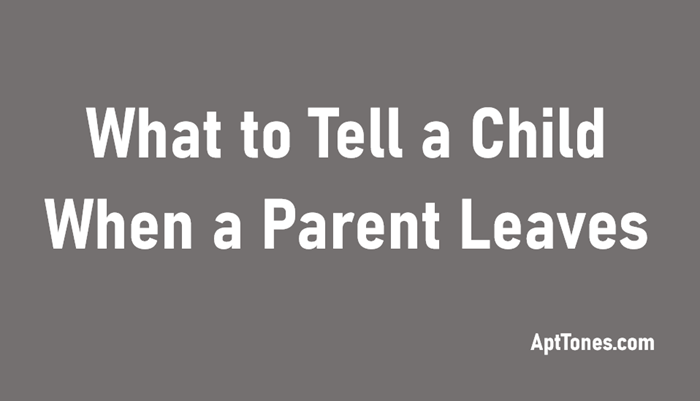When parents need to leave – whether for divorce, work, or other reasons – kids often feel confused and worried. The right words can make all the difference in helping them understand what’s happening.
Children need clear, honest explanations that match their age and emotional needs. What you say and how you say it shapes their ability to cope with the change.
The goal is giving them comfort while being truthful. Simple, caring conversations help kids feel secure even when their world feels uncertain.

What to Tell a Child When a Parent Leaves: 20 Suggestions
In this article, I will share 20 things you can tell a child when a parent leaves. Each response is crafted to provide comfort, reassurance, and support, and I’ll explain why each is appropriate and the best context to use them.
1. Acknowledging Their Feelings
“It’s okay to feel upset or confused about this. Your feelings are important and valid.”
This response acknowledges the child’s emotions and gives them permission to feel whatever they are feeling. It’s important to validate their emotions and let them know it’s normal to feel this way.
2. Reassuring Their Worth
“This is not your fault, and you are so loved. Sometimes, grown-ups have to make hard decisions.”
Children may sometimes blame themselves when a parent leaves. Reassuring them that it’s not their fault and that they are loved is crucial for their self-esteem.
3. Offering Consistency
“I am here for you, and that’s not going to change. You can always count on me.”
Providing a sense of stability and consistency is vital. Let the child know that you are a constant in their life.
4. Emphasizing Unchanged Love
“Just because Dad/Mom is not living with us anymore, it doesn’t mean they don’t love you. Love doesn’t change with distance.”
It’s important to reassure the child that the parent’s love for them has not changed, even if their living situation has.
5. Encouraging Open Communication
“You can talk to me about anything you’re feeling. I’m here to listen whenever you need.”
Encouraging open communication lets the child know that it’s safe to express their thoughts and feelings with you.
6. Focusing on Routine
“We will keep doing our favorite things together. Our routines will stay the same.”
Maintaining routines can provide a sense of normalcy and security for the child.
7. Being Honest Yet Supportive
“Sometimes families go through changes, and it can be tough. But we will get through this together.”
Honesty, combined with reassurance, is key. It’s okay to acknowledge that the situation is difficult while also providing hope.
8. Sharing Feelings
“I miss them too, and it’s okay to feel sad. We can support each other.”
If you also feel sad, sharing your feelings can help the child feel they are not alone in their emotions.
9. Maintaining Connection
“You will still see Dad/Mom. We will make plans for visits and calls.”
Reassuring the child that they will still have a relationship with the absent parent is important for their sense of family continuity.
10. Affirming Family Bonds
“We are still a family, and we care for each other. That’s what families do.”
Affirming that the family bond remains strong, despite the physical absence of a parent, is essential.
11. Keeping Memories Alive
“We have lots of happy memories with Dad/Mom, and we will keep those memories close to our hearts.”
Encouraging the child to cherish good memories helps maintain a positive connection with the absent parent.
12. Encouraging Expression through Art
“If you ever feel like it’s hard to talk about your feelings, maybe you can draw or write about them.”
For children who struggle to verbalize their feelings, creative expression can be an excellent outlet.
13. Recognizing Strength
“You are very brave and strong. I am proud of how you are handling this big change.”
Acknowledging the child’s resilience and strength can boost their confidence and help them cope with the change.
14. Discussing the Future
“There are still so many fun times ahead for us. We have lots to look forward to.”
Focusing on positive future events can provide hope and something for the child to look forward to.
15. Normalizing Their Experience
“Sometimes things like this happen in families, and it’s okay. Many kids go through similar experiences.”
Knowing that they are not alone in their experience can help the child feel more normal and less isolated.
16. Offering Love and Affection
“I love you so much. A big hug from me whenever you need it, okay?”
Physical affection and verbal reassurances of love are powerful tools in comforting a child.
17. Planning New Traditions
“Let’s think of some new fun traditions we can start, just you and me.”
Creating new traditions can help shift the focus to new, positive experiences.
18. Praising Their Coping Skills
“I’ve noticed how well you’re doing with all these changes. You’re handling it better than many grown-ups would.”
Praising the child’s coping skills can reinforce their ability to handle the situation.
19. Encouraging Questions
“If you have any questions about what’s happening, you can always ask me. I’ll do my best to answer them.”
Encouraging questions helps the child understand the situation better and feel more secure.
20. Ensuring Ongoing Support
“No matter what, I’ll always be here to support you. We’re in this together.”
Continuous reassurance of your support and presence is a cornerstone in helping a child navigate the emotional journey of a parent leaving.
Wrap-up
Navigating the conversation with a child when a parent leaves can be delicate. Each of these responses aims to provide comfort, reassurance, and a sense of stability.
It’s important to remember that every child is different, and their reaction to the situation will be unique. Being present, listening, and offering a steady source of love and support are the most crucial aspects during this time.